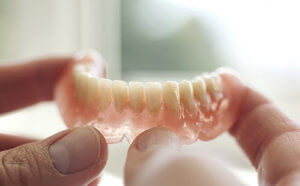When you have missing teeth, your confidence suffers from every hidden smile. Eating is also more difficult, and your face changes shape. But dentures replace missing teeth so you can have the confident, magnetic smile you deserve. Through today’s dental appliances you enjoy comfort and a natural appearance.
What are Dentures?
 In the past centuries, dentures have commonly provided replacement of missing teeth. In fact, wearing them was a typical part of aging. These dental appliances changed from the wooden teeth of George Washington’s era to plastic models in the 20th century. While today’s denture appliances are similar to those of past generations, they now offer greater comfort and a more natural appearance.
In the past centuries, dentures have commonly provided replacement of missing teeth. In fact, wearing them was a typical part of aging. These dental appliances changed from the wooden teeth of George Washington’s era to plastic models in the 20th century. While today’s denture appliances are similar to those of past generations, they now offer greater comfort and a more natural appearance.
Not replacing your missing teeth causes changes to your facial appearance and smile. Your facial muscles droop, without teeth to support them. This makes you appear older than your actual age. Your speech and diet also undergo changes when you do not have the teeth you need for these purposes.
Two types of denture appliances exist today, complete dentures and partial dentures. Your dentist helps you understand which suit your needs best. Of course, one determining factor is whether you need some or all of your teeth replaced.
Complete Dentures vs. Partial Dentures
Complete dentures feature a flesh-colored base made of acrylic that matches and fits over your gums. The full dentures’ upper base covers the roof of your mouth, called the palate. For lower teeth replacement, the denture fits over your bottom gums with space for your tongue.
Your denture appliance is custom crafted in a dental lab to fit your mouth. The process involves your dentist taking impressions of your mouth, then sending those impressions to the lab.
For complete dentures, your dental team removes any remaining teeth and allows the tissues to heal. Sometimes this healing takes a few months. During that period of time, you do not have teeth. That is, unless you gain immediate full dentures which require adjustment after several months.
Partial dentures get support from a metal framework attached to nearby natural teeth, like a bridge. Sometimes this framework includes a crown for one or more of the natural teeth. But unlike dental bridges, you can remove your partial denture.
Taking Care of Your Tooth Replacement Device
Taking care of your partial or complete dentures enables them to last a very long time. But these dental devices require periodic maintenance. For these repairs and adjustments, you should see your dentist at least once a year.
Denture repairs involve relining, remaking or rebasing the device after regular wear. Rebasing provides a new base with your existing set of denture teeth. Your mouth also changes shape as you age, making adjustments necessary. Otherwise, your teeth replacements become loose, uncomfortable and difficult to wear.
To provide the best care for your complete or partial dentures, consider these valuable tips:
- Be careful not to drop them, as they can break
- Soak them when not wearing, to prevent drying out and warping
- Brush the device daily, just as you do your natural teeth
- Do not self-adjust or attempt a repair on your appliance
Although your dentures feel uncomfortable at first, you gain comfort over the first weeks or months of wear. You also need practice speaking as your facial muscles, cheeks and tongue learn how to hold the appliance in place. At first, you may experience some crowding around your tongue, minor soreness, and excessive saliva. But soon your teeth look and feel natural, youthful and attractive.
Tooth Replacement and Other Dental Solutions at Marketplace Dental Excellence in Queen Creek
Marketplace Dental Excellence provides patients with many dental solutions and services in Queen Creek, Arizona. These dental services include:
If you need replacements for one tooth or a whole set of teeth, Marketplace Dental Excellence provides the most modern options for your most natural smile. Call Marketplace Dental Excellence now at 480.545.8700 to learn more about dentures or implants for your missing teeth.

